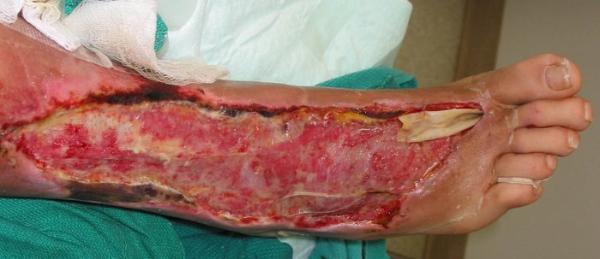
Necrotizing fasciitis
Necrotizing soft tissue infections are a broad category of bacterial and fungal skin
infections. Descriptive terms vary based on the location, depth, and extent of infection (e.g.,
Fournier's gangrene [necrotizing perineal infection], necrotizing fasciitis [deep subcutaneous
infection]). Depending on the depth of invasion, necrotizing soft tissue infections can cause
extensive local tissue destruction, tissue necrosis, systemic toxicity, and even death. Despite
surgical advances and the introduction of antibiotics, reported mortality rates for necrotizing
soft tissue infections range from 6 percent to as high as 76 percent.1
The organisms isolated most often in polymicrobial necrotizing soft tissue infections are
combinations of staphylococci (especially Staphylococcus epidermidis with b-hemolytic
streptococci), enterococci, Enterobacteriaceae species (commonly Escherichia coli,
Proteus mirabilis, Klebsiella pneumoniae, and Pseudomonas aeruginosa), streptococci,
Bacteroides/Prevotella species, anaerobic gram-positive cocci, and Clostridium
species.11,12
In San Francisco, most of the water used for
landscape watering and for various water features
is now provided by the use of recycled effluent
(reclaimed water) from the city's sewage treatment
plant. It appears that water used to irrigate parks
may not be as clean as claimed.
An aerial view of Golden Gate Park from The Panhandle (at left, east, edge of picture) to the Pacific Ocean
City and County of San Francisco San Francisco Department of Public Health
HEALTH ALERT
November 11, 2005
CLUSTER OF NECROTIZING SOFT-TISSUE INFECTIONS IN INJECTION DRUG USERS
A cluster of cases of necrotizing soft-tissue infections has been recognized in injection drug
users in San Francisco. It is possible that additional cases will occur. To date the common
characteristic among cases is that all persons are injection drug users. Bacteriologic results
have yielded a variety of organisms including Group A Streptococcus, Pseudomonas,
Citrobacter spp, E. coli, and Staphylococcus aureus. Because this infection can
initially appear innocuous but then progress rapidly to a life-threatening condition, we request
that clinicians be alert for possible cases and follow the recommendations below.
This Health Alert is posted on our website www.sfdph.org/cdcp. Click on Health Alerts in the
left hand column.
Soft Tissue Infection
aggressive debridement and surgery
Photo courtesy of Dr. Edward McGowan
More graphic images:
http://images.google.com/images?hl=en&ie=ISO-8859-1&q=necrotizing&btnG=Search+Images
&gbv=2
http://images.google.com/images?hl=en&ie=ISO-8859-1&q=soft+tissue+infection&btnG=Searc
h+Images&gbv=2
Necrotizing soft tissue infections are a broad category of bacterial and fungal skin
infections. Descriptive terms vary based on the location, depth, and extent of infection (e.g.,
Fournier's gangrene [necrotizing perineal infection], necrotizing fasciitis [deep subcutaneous
infection]). Depending on the depth of invasion, necrotizing soft tissue infections can cause
extensive local tissue destruction, tissue necrosis, systemic toxicity, and even death. Despite
surgical advances and the introduction of antibiotics, reported mortality rates for necrotizing
soft tissue infections range from 6 percent to as high as 76 percent.1
The organisms isolated most often in polymicrobial necrotizing soft tissue infections are
combinations of staphylococci (especially Staphylococcus epidermidis with b-hemolytic
streptococci), enterococci, Enterobacteriaceae species (commonly Escherichia coli,
Proteus mirabilis, Klebsiella pneumoniae, and Pseudomonas aeruginosa), streptococci,
Bacteroides/Prevotella species, anaerobic gram-positive cocci, and Clostridium
species.11,12
In San Francisco, most of the water used for
landscape watering and for various water features
is now provided by the use of recycled effluent
(reclaimed water) from the city's sewage treatment
plant. It appears that water used to irrigate parks
may not be as clean as claimed.
An aerial view of Golden Gate Park from The Panhandle (at left, east, edge of picture) to the Pacific Ocean
City and County of San Francisco San Francisco Department of Public Health
HEALTH ALERT
November 11, 2005
CLUSTER OF NECROTIZING SOFT-TISSUE INFECTIONS IN INJECTION DRUG USERS
A cluster of cases of necrotizing soft-tissue infections has been recognized in injection drug
users in San Francisco. It is possible that additional cases will occur. To date the common
characteristic among cases is that all persons are injection drug users. Bacteriologic results
have yielded a variety of organisms including Group A Streptococcus, Pseudomonas,
Citrobacter spp, E. coli, and Staphylococcus aureus. Because this infection can
initially appear innocuous but then progress rapidly to a life-threatening condition, we request
that clinicians be alert for possible cases and follow the recommendations below.
This Health Alert is posted on our website www.sfdph.org/cdcp. Click on Health Alerts in the
left hand column.
Soft Tissue Infection
aggressive debridement and surgery
Photo courtesy of Dr. Edward McGowan
More graphic images:
http://images.google.com/images?hl=en&ie=ISO-8859-1&q=necrotizing&btnG=Search+Images
&gbv=2
http://images.google.com/images?hl=en&ie=ISO-8859-1&q=soft+tissue+infection&btnG=Searc
h+Images&gbv=2

